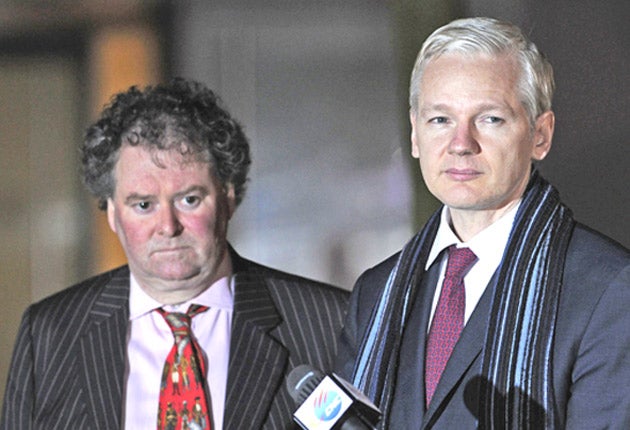Assange lawyer admits he was wrong over interview

Julian Assange's lawyer told a court yesterday that prosecutors attempted to interview the WikiLeaks founder over sexual assault allegations while he was still in Sweden.
Bjorn Hurtig's admission contradicts his previous claim that the Swedish authorities had only asked to speak with Mr Assange after he had left the country. The lawyer admitted under cross-examination that he was mistaken to suggest that he had heard nothing from prosecutor Marianne Ny until after Mr Assange had left the country.
He accepted that he was in regular contact via text message and telephone with Ms Ny, but had forgotten to include the fact in his witness statement. In that document, he said that Ms Ny had not attempted to contact Mr Assange for five weeks – when Mr Assange, 39, was no longer in Sweden.
But yesterday, questioned by Clare Montgomery, for the Swedish authorities, he accepted that the delay was just three weeks. He said: "I have actually said that and that was wrong. It is true that that gave an impression which was to the advantage of Julian." Mr Hurtig said he realised his error earlier this week when preparing for his appearance yesterday.
The Swedish lawyer said the mistake was "embarrassing" and "should not have happened" but added: "It is important for Julian Assange that my statement is correct."
Mr Hurtig denied that it was he who told Mr Assange to leave the country, warning that he risked being arrested. And he also denied that he had told Ms Ny that Mr Assange had no intention of returning to Sweden to be interrogated. Mr Assange is wanted in Sweden over allegations that he sexually assaulted two women in August. He denies the accusations. Yesterday's extradition hearing, sitting at Woolwich Crown Court in London, heard that Ms Ny had first spoken with Mr Hurtig on 15 September, when she agreed there was nothing to stop Mr Assange leaving Sweden. But six days later she contacted Mr Hurtig requesting an interview with Mr Assange. But despite Ms Ny and Mr Hurtig being in regular contact, the lawyer was not able to speak to his client to arrange for him to be interviewed before he left Sweden on 27 September – the same day a Swedish arrest warrant was issued against him.
Mr Hurtig said he was unable to reach Mr Assange and did not realise that he had left the country until he received a telephone call on 29 September. By then the Australian was in Germany, and later flew to Britain.
There were subsequent attempts to arrange an interview with him in October, but the arrangements did not suit Mr Assange and a date he suggested did not meet with the approval of Ms Ny.
In November, the prosecutor informed Mr Hurtig that she planned to issue a European arrest warrant.
Yesterday, the court also heard that investigators have collected around 100 messages between Mr Assange and his two alleged victims which undermine the case against him.
Mr Hurtig said the texts indicate the women expected to be paid, intended to get "revenge" and wanted to contact newspapers to "blast" his client's reputation. But Mr Hurtig said he had not been allowed to access the texts, making it impossible for Mr Assange to receive a fair trial.
The case continues on Friday.
